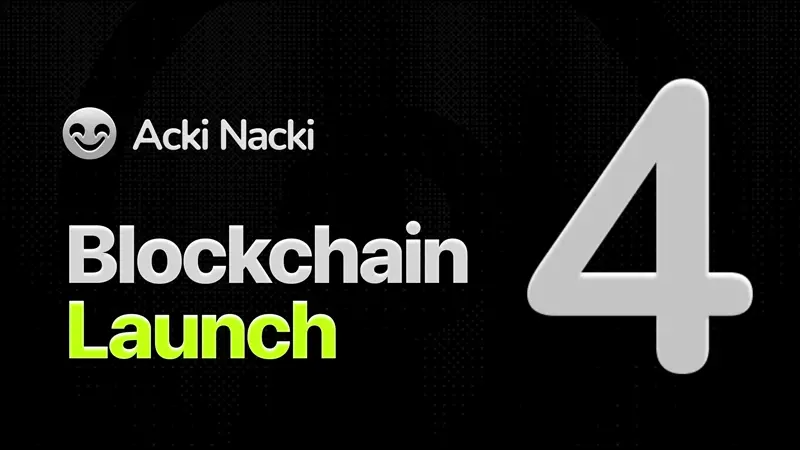Web3 has a weird problem: most of its infrastructure was built for finance, not gameplay. High fees, slow finality, and limited parallel execution make real-time, complex, player-versus-player games a nightmare to build on-chain.
Acki Nacki flips that. It’s a probabilistic proof-of-stake chain engineered for:
-
High-speed execution
-
True fairness in block production
-
MEV-resistant mechanics
-
Parallel processing of transactions
-
And, critically, on-chain computation that actually scales
This isn’t a fork of Ethereum with some plugins. It’s its own protocol, ground-up.
🧠 At the Core: Probabilistic Proof of Stake
Let’s start with the heart of it. Acki Nacki doesn’t rely on static staking rewards or fixed leader slots. Instead, it uses a probabilistic model to determine who gets to validate and produce blocks. The more honestly you participate, the more consistent your uptime, the more accurately you perform network duties, the more the network rewards you probabilistically over time.
There are no staking pools, no delegation games. Your reputation matters more than your size. It’s a protocol that favors honesty over capital.
Think of it like poker. You’re not rewarded for how much you bring to the table, but how well, and consistently, you play.
🧩 Modular Participation: Everyone Has a Role
The network breaks down roles into modular components:
-
Block Producers – write blocks.
-
Block Keepers – verify blocks and ensure consistency.
-
Acki-Nackis – a rotating subset of verifiers with finality powers.
-
Block Managers – handle data, distribute rewards, and process external messages.
-
Mobile Verifiers – lightweight participants that verify subnets of activity, making decentralization massive.
This design allows more people, even mobile users, to actively contribute to security, validation, or computation without needing a rack of servers or an AWS subscription.
🔐 Fairness and MEV Immunity
Fairness isn’t a marketing word here, it’s math.
In Acki Nacki, rewards aren’t given for simply producing blocks, but for participating in the full lifecycle of validation. And because the transaction model is asynchronous, the exact order of incoming messages can’t be gamed for profit.
That means no front-running, no sandwich attacks, and virtually no Miner Extractable Value (MEV). Try building a fair game economy on Ethereum and you’ll see why this matters.
🪙 Two Tokens, Two Purposes: NACKL & SHELL
Acki Nacki separates security and computation, a smart move few chains have the guts to do.
-
NACKL is the network token. It’s used for staking, earns a share of transaction revenues, and represents your “skin in the game.”
-
SHELL is the compute token. It pays for usage. It can only go down in price, never up, a design that ensures compute stays affordable and resists speculation.
This split means the network stays secure while computation remains cheap, perfect for games like Popit that run their logic entirely on-chain.
Imagine if Ethereum gas fees never went up, only down, but staking still rewarded you over time. That’s the Acki Nacki design.
🧠 Bonus Brain Candy: Reputation Coefficient
Long-term players and validators aren’t just praised, they’re paid more.
Acki Nacki introduces a Reputation Coefficient, an extra multiplier on your earnings if you validate consistently over time without breaking rules. Miss an epoch? You’re reset. It’s like a loyalty system baked into consensus itself.
It’s also a great metaphor for life: consistency beats short-term hustle.
📈 Designed for Scalability, Without Compromise
Where other blockchains clog up or offload to L2s, Acki Nacki just opens more threads. Literally.
It’s a multi-threaded execution environment. When network demand increases, it spawns more parallel computation, no need for fragmented rollups, bridges, or hacks. It’s vertical and horizontal scaling, built-in.
🚫 What It’s Not
Let’s be clear. Acki Nacki is not:
-
A fork of Ethereum
-
A Solana clone
-
A “fast chain” with centralized validators
-
A temporary workaround for game devs
It’s a protocol that reimagines how decentralized systems work, built for high-throughput, fair-execution apps like Popit Game.
🧭 Final Thoughts: The “Unseen” Game Engine
Acki Nacki isn’t flashy, and maybe that’s why it’s powerful. It’s the kind of infrastructure you don’t notice when it works. But it’s what makes wild game ideas like Popit not just possible, but playable.
In a world chasing Layer 2s, zero-knowledge proofs, and gas optimization gymnastics, Acki Nacki just quietly does the job, fast, fair, and with style.




